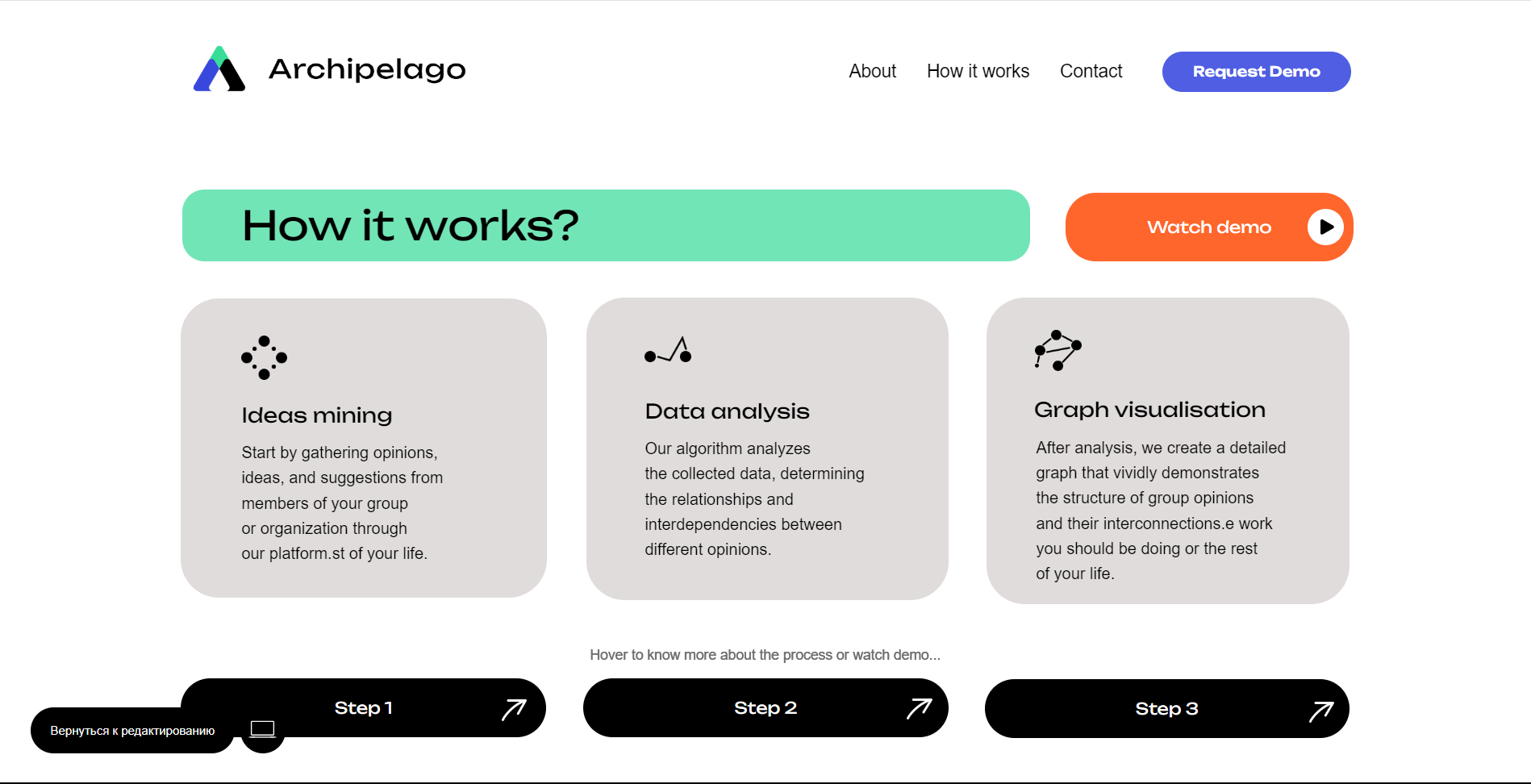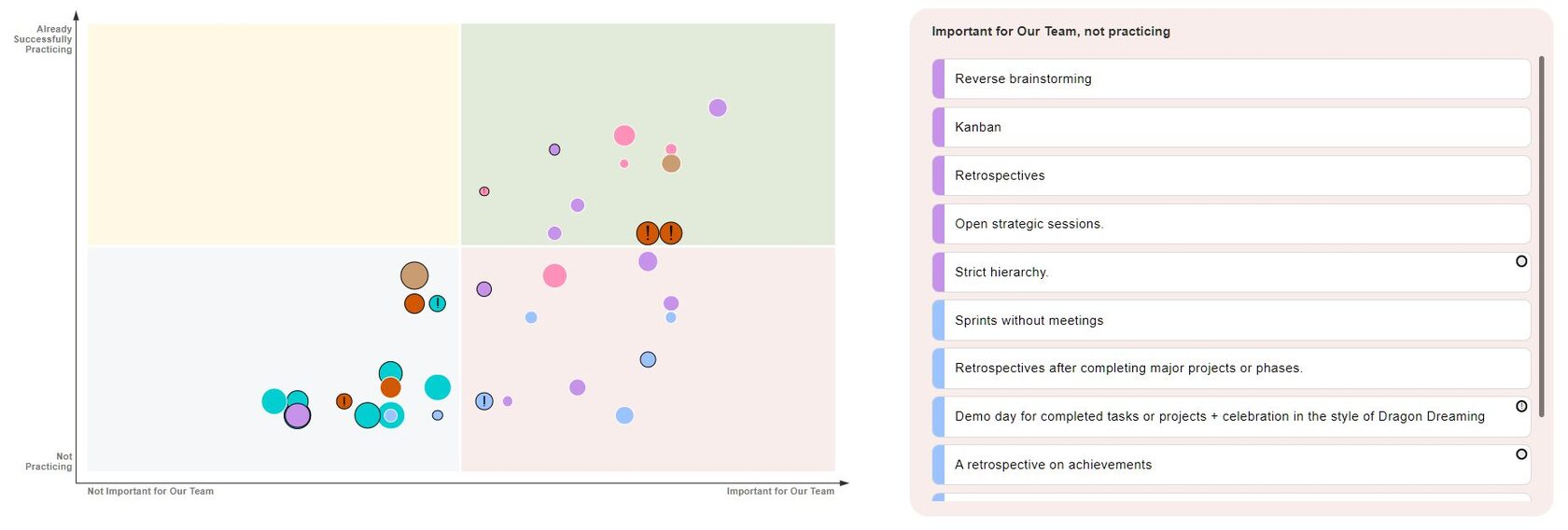

Case study
The Invisible Thread

Transforming remote team dynamics through Archipelago
The challenge
In 2023, a high-performing remote team of 12 software developers across three continents faced a paradox: while meeting all KPIs, their leader, Marcus Chen, sensed an untapped potential beneath the surface. Despite countless articles on remote team management, Marcus needed a data-driven approach to uncover hidden dynamics and optimize team performance without disrupting their existing workflow.
1
The approach: See the invisible
2
Total time investment: Only 45 minutes per team member.
Try out our interface for each stage here
I noticed something surprising about our bonding activities. Traditional team-building didn’t resonate much, but our problem-solving sessions - those really brought us together. It seems that tackling challenges as a group naturally strengthens our bonds, without needing extra 'team-building' activities.
Opinion Gathering
Implementation
Sorting
4
Take a look at the interactive final dashboard here to gain experience in using Archipelago
Asynchronous Opinion Gathering
- An intuitive, user-friendly interface encouraged participants to provide detailed responses
- 42 unique practices emerged, covering everything from communication protocols to decision-making frameworks
Cross-Evaluation
Instant Data Processing and Visualisation
- Archipelago automatically aggregated data into an interactive dashboard
- AI-powered clustering revealed unexpected patterns in team preferences
- Real-time visualisations highlighted areas of agreement, tension points, and improvement opportunities
- Bottom-up identification of improvement areas allowed the team to shape their priorities
- Matched team members' aspirations with implementation needs, generating actionable roadmaps
Multi-dimensional Analysis
- Clustering and sorting techniques offered structured insights
- Practices were evaluated along two axes: Importance vs. Current Implementation Success Rate
- Team members could volunteer to lead in implementing practices
Result
6
The Archipelago procedure was not only a source of insights, but also
a good team reward in itself. It was useful not only for realizing something external, but also proved valuable in itself.
a good team reward in itself. It was useful not only for realizing something external, but also proved valuable in itself.
Short-term Impact
Long-term transformation
27% increase in voluntary knowledge sharing
Introduction of 5-minute daily team retrospectives
Creation of dedicated problem-solving channels
Introduction of 5-minute daily team retrospectives
Creation of dedicated problem-solving channels
40% reduction in meeting time through optimized async communication
Development of team-specific best practices playbook
Establishment of peer-led improvement initiatives
Development of team-specific best practices playbook
Establishment of peer-led improvement initiatives
Scalable lessons
5
Data Visualisation
- Use algorythms to surface hidden team dynamics
- Prioritize evidence-based decision making
- Regular pulse-checking through automated tools
Data-driven culture building
- Empower team members to shape working environment
- Focus on problem-solving as a team-building tool
- Build implementation plans around volunteer champions
Engagement through agency
- Replace generic best practices with team-specific insights
- Leverage AI for continuous team dynamics monitoring
- Balance structure with organic team evolution
Adaptive management
What hidden or under-discussed practices within our workflow do you believe, if improved, could significantly enhance our effectiveness and collaboration?
Question Marcus asked his team
Archipelago transformed abstract team dynamics into specific, focused, actionable insights while maintaining the human element essential for remote team success.
I realized that structured reflection was missing in our routine. Only about 15% of our practices included any sort of retrospective, but almost everyone saw it as crucial. So, I’m thinking: let’s incorporate ‘micro-retrospectives’ into our daily workflow. Just a quick reflection to help us adapt and grow continuously
One of our greatest strengths is our open discussion culture. We don’t just focus on technical skills; it’s about feeling safe to share, challenge, and problem-solve together. Our success clearly depends on psychological safety more than on any set of procedures.
Key Takeaways from Marcus
Marcus was able to highlight specific practices that could benefit from targeted improvements.
Through Archipelago’s insights, he was also given a comprehensive list of motivated team members who not only saw the value in these changes but were eager to contribute their skills and perspectives to the implementation process.
Actionable Plan
3
Unconventional Team Practices
Effective Team Methods
Team Learning and Celebration
Supportive Team Environment
Mindful Team Practices
Building Trust and Collaboration
26%
14%
24%
19%
12%
5%


"
"
"
"
Marcus used Archipelago to conduct a "digital anthropology" of his team's working culture, employing a distinctive, structured approach:





Case study
The Invisible Thread

Transforming remote team dynamics through Archipelago
The challenge
In 2023, a high-performing remote team of 12 software developers across three continents faced a paradox: while meeting all KPIs, their leader, Marcus Chen, sensed an untapped potential beneath the surface. Despite countless articles on remote team management, Marcus needed a data-driven approach to uncover hidden dynamics and optimize team performance without disrupting their existing workflow.
1
Total time investment: Only 45 minutes per team member.
Try out our interface for each stage here
Opinion Gathering
Asynchronous Opinion Gathering
- An intuitive, user-friendly interface encouraged participants to provide detailed responses.
- 42 unique practices emerged, covering everything from communication protocols to decision-making frameworks.
Instant Data Processing
and Visualisation
and Visualisation
- Archipelago automatically aggregated data into an interactive dashboard.
- AI-powered clustering revealed unexpected patterns in team preferences.
- Real-time visualisations highlighted areas of agreement, tension points, and improvement opportunities.
- Bottom-up identification of improvement areas allowed the team to shape their priorities.
- Matched team members' aspirations with implementation needs, generating actionable roadmaps.
Multi-dimensional Analysis
- Clustering and sorting techniques offered structured insights.
- Practices were evaluated along two axes: Importance vs. Current Implementation Success Rate.
- Team members could volunteer to lead in implementing practices.
The approach: See the invisible
Sorting
2
Cross-Evaluation
Data Visualisation
What hidden or under-discussed practices within our workflow do you believe, if improved, could significantly enhance our effectiveness and collaboration?
Question Marcus asked his team
"
Marcus used Archipelago to conduct a "digital anthropology" of his team's working culture, employing a distinctive, structured approach:
Marcus was able to highlight specific practices that could benefit from targeted improvements.
Actionable Plan
3
Implementation
4
Short-term Impact
Long-term transformation
27% increase in voluntary knowledge sharing
Creation of dedicated problem-solving channels
Introduction of 5-minute daily team retrospectives
40% reduction in meeting time through optimized async communication
Establishment of peer-led improvement initiatives
Development of team-specific best practices playbook
I noticed something surprising about our bonding activities. Traditional team-building didn’t resonate much, but our problem-solving sessions - those really brought us together. It seems that tackling challenges as a group naturally strengthens our bonds, without needing extra 'team-building' activities.
I realized that structured reflection was missing in our routine. Only about 15% of our practices included any sort of retrospective, but almost everyone saw it as crucial. So, I’m thinking: let’s incorporate ‘micro-retrospectives’ into our daily workflow. Just a quick reflection to help us adapt and grow continuously
One of our greatest strengths is our open discussion culture. We don’t just focus on technical skills;
it’s about feeling safe to share, challenge, and problem-solve together. Our success clearly depends on psychological safety more than on any set of procedures.
it’s about feeling safe to share, challenge, and problem-solve together. Our success clearly depends on psychological safety more than on any set of procedures.
Key Takeaways from Marcus
Through Archipelago’s insights, he was also given a comprehensive list of motivated team members who not only saw the value in these changes but were eager to contribute their skills and perspectives to the implementation process.
"
"
"
- Use algorythms to surface hidden team dynamics
- Prioritize evidence-based decision making
- Regular pulse-checking through automated tools
Data-driven culture building
Engagement through agency
- Empower team members to shape working environment
- Focus on problem-solving as a team-building tool
- Build implementation plans around volunteer champions
- Replace generic best practices with team-specific insights
- Leverage AI for continuous team dynamics monitoring
- Balance structure with organic team evolution
Adaptive management
Take a look at the interactive final dashboard here
to gain experience
in using Archipelago
to gain experience
in using Archipelago
Scalable lessons
5
Result
6
Archipelago transformed abstract team dynamics into specific, focused, actionable insights while maintaining the human element essential for remote team success.
The Archipelago procedure was not only a source of insights, but also a good team reward in itself. It was useful not only for realizing something external, but also proved valuable in itself.
